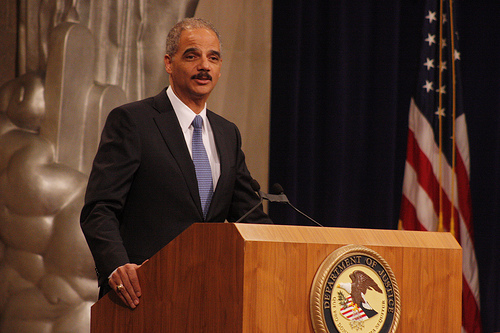


Advocates came to the defense of Attorney General Eric Holder when The Washington Times slammed a Justice Department memo that encouraged hiring people with disabilities.
A couple weeks ago, when our attention was focused on the preparation for the Paralympic games in London, we stumbled across The Washington Times editorial, whose full title, “Holder’s ‘severe mental deficiency’: Justice Department takes affirmative action to crazy extremes,” was certainly provocative enough to warrant a click-through.
The op-ed’s content was as abhorrent as the title advertised. Referencing a memo from the U.S. Attorney General’s Office notifying employees of its intention to hire more people with disabilities — as per President Obama’s 2012 executive order — the op-ed blasted its contents as a discriminatory policy that would give employment preference to “targeted mentally challenged individuals.”
What’s more, the “grab-bag category of undefined ‘current severe physical, intellectual or mental conditions’” made the practice as susceptible to fraud as those swing state voting booths. After all, who wouldn’t want to self-identify as an individual with a disability now and reap all the perks it entails?
Continuing coverage of the Paralympics games provided much more palatable content to focus on here. But fortunately, organizations who advocate for people with disabilities did not give the Times editorial board a pass. On August 27, Michelle Diament of Disability Scoop had statements of rebuke from officials at The Arc and the National Council on Disability.
A day later, the Times published this letter to the editor from National Disability Rights Network executive director Curtis Decker that not only took the newspaper to task for equating disability with unqualified but corrected the untruths about the Attorney General’s memo. Decker wrote:
In the editorial […] you dismiss outright the notion that people with mental illness or intellectual disabilities can be employed… People with mental illness and intellectual disabilities — including many world leaders, poets, artists and scientists — work and thrive in all aspects of modern society.
On September 3, the Attorney General Holder gave his own two cents in a letter to the editor, pointing out that only 11,000 of the 116,000 employees in the Justice Department are lawyers. Other jobs include human resources, finance, and information technology, all of which can be capably filled by individuals with disabilities, wrote Holder.
The backlash was not all external either. The Washington Times hosts a comprehensive “Communities” section of online content that celebrates “social journalism from independent voices.” Jean Winegardner whose Autism Unexpected blog under the “Family Today” category has posts dating back to December 2009, wrote her rebuttal on the same day as Decker’s op-ed. Before closing with the suggestion she might pull her column, she offers this eloquent support for the federal government’s goals to increase employment opportunities for people with disabilities:
American taxpayers are themselves an incredibly diverse population, and they deserve to be served by public employees who reflect that diversity. That such an editorial was published at all demonstrates how sorely such policies are needed, and how far we have to go to attain equality and inclusion for the disabled community.
The Washington Times has a reputation as being politically conservative. Earlier this year, columnist James Bovard criticized the U.S. Department of Labor’s proposed rule to require federal contractors to actively recruit individuals with disabilities with similar but less bilious rhetoric. Do you think they went too far this time? Tell us in the comments section.
Image by Ryan J. Reilly.